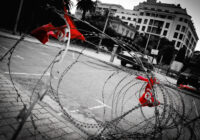The international community must recognize that further delay at peace-making in Yemen will only wreck more lives.
“Allah is great, death to America, death to Israel, curse the Jews, victory for Islam.” Known as al-sarkha, this is the banner carried by Shia Houthi rebels in their demonstrations in Yemen. Usually, youth are enlisted as flag bearers, carrying on the customary role allocated by resistance movements to inoculate the young and marginalized into their ranks. When chanted, from Iran to Mauritania, it reflects the creed of those who believe that a movement need only be in opposition to be credible. Often guided by an ephemeral vision of victory over an oppressor, it provides little in the way of a substantial prospect for peace and prosperity. Victory is all that matters.
I must confess that I am a fan of Yemen, having served there as Peace Corps’ training director in 1974, when there were no hotels, one local restaurant in the capital Sanaa, and a ring road recently completed by the Chinese connecting the larger cities in the north (we were not allowed to travel into South Yemen). It was a romantic location beyond description, with no running water, intermittent power, few Yemeni English-speakers and the seeds of coming conflicts being sown daily. Much like Mali and the Western Sahara, there were pockets of tribes that resisted any central government role, demanding autonomy and a fair share of the country’s few resources.
How a seemingly remote inter-tribal conflict turned into the awful and desperate situation that is Yemen today can largely be attributed to external forces: Saudi Arabia and Iran being the most recent. Riyadh and Tehran have infused their Sunni-Shia confrontation into the fiber of the life of Yemen, disrupting any opportunity for the initial agreements arrived at through a national dialogue to bear fruit. Iran enabled the Houthis to acquire the arms and discipline needed to join with former President Abdullah Ali Saleh to overthrow the democratically elected government and put an end to any aspirations for national reconciliation. The Houthis quickly took over some 70% of the territory and, with an Islamic State insurgency in the southeast of Yemen, ensured that the country would be damned into instability for some time.
This is not to excuse or justify the reactions of Saudi Arabia, the United Arab Emirates and the Arab coalition battling the Houthis. Those transgressions are well publicized, if somewhat distorted. The Arabs will eventually go home — there really is nothing to keep them in Yemen. What is of concern is how the Houthis are changing the character of Yemenis, so that retribution trumps reconciliation and coming generations are imbued with norms that are hardly conducive to compromise and innovation.
As recounted in a recent publication by the Yemeni Embassy in Washington, DC, “The Houthis originally sought an end to what they observed as efforts to marginalize Zaydi [Shia] communities and beliefs; but their aspirations amplified both in magnitude and resolve in the wake of the 2011 uprisings [Yemen’s Arab Spring] and government collapse, and embraced a broader populist, dissident message to counter the establishment.” As the civil war amplified and the control of territory and people moved back and forth between the combatants, the Houthis undertook an effort at re-education of the people and youth under their control both to reduce dissident voices and to build a generation of committed fighters.
They dusted off educational methods evolved from Mao Zedong’s China and Fidel Castro’s Cuba to more recent versions adapted by Iran and Daesh (Islamic State), in order foster a behavioral outlook filled with an acute anti-Americanism and anti-Semitism. This view encourages youth to rage against the US and Israel as the primary evil attacking Yemen by manipulating Saudi Arabia, the UAE and other Arab countries and European allies.
Here is an example from one of the textbooks used in Houthi schools. It teaches math by counting weapons. And another that repeats the charges against the aggressors. It is clear that if there is to be a political compromise leading to a degree of stability in the country, a key intervention must be made with Yemini youth to separate them intellectually and morally from the emphasis on armed conflict and punishing those who disagree with them.
Challenges
But this is only one part of the complex threat from this distant conflict. Yemen has a geopolitical prominence as the southern entrance to the Red Sea. The Houthis continue to threaten maritime transit of US Navy, oil tankers and freighters. The threat to freedom of navigation and the world’s oil and commercial goods transiting the Red Sea via the Bab al-Mandeb Strait cannot be ignored. Ironically, this is also not in Iran’s interests if it ever resumed commercial shipping through the Suez Canal.
In remarks at a US Senate hearing, Senator John Cornyn raised his concerns that 3.8 million barrels of oil pass through the Bab al-Mandeb every day, underscoring the global importance of a peaceful and stable Yemen. Warning against attempts to limit US support to the Arab coalition, Secretary of Defense James Mattis said in March that “Withdrawing U.S support would embolden Iran to increase its support to the Houthis, enabling further ballistic missile strikes on Saudi Arabia and threatening vital shipping lanes in the Red Sea, thereby raising the risk of a regional conflict.”
This should make clear that the only winner in the absence of US presence and support of the coalition is Iran gaining strength to continue its expansion throughout the Middle East via local militias trained and mobilized by Hezbollah and the Iranian Revolutionary Guard. Additionally, the Arab Federation for Human Rights found that the Houthis have planted more than half a million anti-personnel mines in different parts of Yemen, not to mention mines in sea lanes.
There are many challenges facing Yemen: radicalized youth, aggression against Yemeni and Saudi civilians, missiles used against a range of land and sea targets, and the fundamental issue of what will happen to this lost generation of Yemeni young people who could be the next terrorist threats to the US and Europe. This calls for a more concerted effort to reduce the violence, support the latest UN efforts for a national conference, and provide the ingredients for long-term, inclusive and sustainable solutions.
The US must bring its influence to bear on Saudi Arabia, the UAE and the Arab coalition, as well as Russia, to bring the parties to the table with few preconditions. Unfortunately, according to a UN report in January, the “UN Panel of Experts suggested that neither side’s leaders have suffered enough to make them compromise—in sharp contrast to their civilian constituents.”
There is never a fortuitous time for taking risks for peace. The international community must recognize that further delay at peace-making will only wreck more lives, spread even more catastrophe among the civilian populations and harden positions beyond compromise. The time is now for responsible actions that lessens threats emanating from the Yemen War and its consequences for the youth and people of that country.
The views expressed in this article are the author’s own and do not necessarily reflect Fair Observer’s editorial policy.
Photo Credit: RAUFITOO / Shutterstock.com
Support Fair Observer
We rely on your support for our independence, diversity and quality.
For more than 10 years, Fair Observer has been free, fair and independent. No billionaire owns us, no advertisers control us. We are a reader-supported nonprofit. Unlike many other publications, we keep our content free for readers regardless of where they live or whether they can afford to pay. We have no paywalls and no ads.
In the post-truth era of fake news, echo chambers and filter bubbles, we publish a plurality of perspectives from around the world. Anyone can publish with us, but everyone goes through a rigorous editorial process. So, you get fact-checked, well-reasoned content instead of noise.
We publish 2,500+ voices from 90+ countries. We also conduct education and training programs
on subjects ranging from digital media and journalism to writing and critical thinking. This
doesn’t come cheap. Servers, editors, trainers and web developers cost
money.
Please consider supporting us on a regular basis as a recurring donor or a
sustaining member.
Will you support FO’s journalism?
We rely on your support for our independence, diversity and quality.






